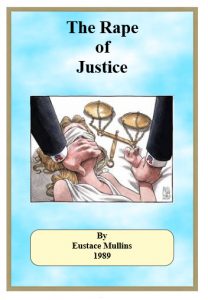Foreword
In my travels throughout the United States, I have found that the first complaint of our citizens is the sorry state of our legal system. They do not complain that the laws themselves are onerous, but rather that their administration is almost universally unfair and unjustified. I have even heard farmers arguing with each other at their markets, each protesting with inverted pride that “Our county has the crookedest lawyers and judges in this state,” only to be met with the fervent response from a farmer representing another county, “Oh, no, our lawyers and judges are a lot crookeder than the ones in your county!”
Americans recognize that we must have laws, and that we must abide by them, otherwise life would become intolerable. The problem is that law-abiding citizens are usually greeted in our courts with disbelief that anyone still obeys the laws in this nation, and two, that a legal system which is operated by and for criminals has no greater enemy than the law-abiding citizen.
The first purpose of law has always been “Salus Populi,” the safety of the people. I write this in a building which has five locks on every door. Twenty-five years ago, the doors were never locked. We hardly knew where the key to the front door was kept. With hundreds of other citizens in Washington during its tropical summers, I went to a nearby park to sleep in the era before air conditioning. Today, no one in his right mind would close his eyes in a Washington park, either by day or by night. It is rightfully known as the “murder capital of the world,” rather than as the capital city of the United States of America.
This situation has been created, not by the negligence of the police, who are working harder than ever, but by the legal system, which abruptly denied the previous basis of our legal system, “Salus Populi,” in 1933, with the advent of President Franklin Delano Roosevelt, who adopted the Marxist concept that the legal system was being used unfairly to defend property. Because of the Communist decree that all property was now the property of the state, the legal system need no longer defend crimes against personal property. This was soon extended to crimes against persons. The doctrine of compulsory equality meant that no citizen was entitled to wear a gold watch or to live in a large home.
Other citizens who wished to deprive them of their excess property, even at the cost of their lives, were looked upon with approval by the legal system. If they injured or killed too many citizens in their exuberance, they might be confined for a short time, but they were soon released to continue the Marxist campaign of “levelling,” that is, of reducing all citizens to a common level of fear and despair. This goal was first achieved in the Soviet Union, when Wall Street bankers financed the “noble experiment in compulsory equality.” Soviet Russia was reduced to a giant concentration camp, a Gulag in which tomorrow might be worse than today, but it would surely be no better. The United States has travelled that same road with remarkable speed, constantly accelerating the techniques which force our citizens to new levels of personal depth and degradation.
.
